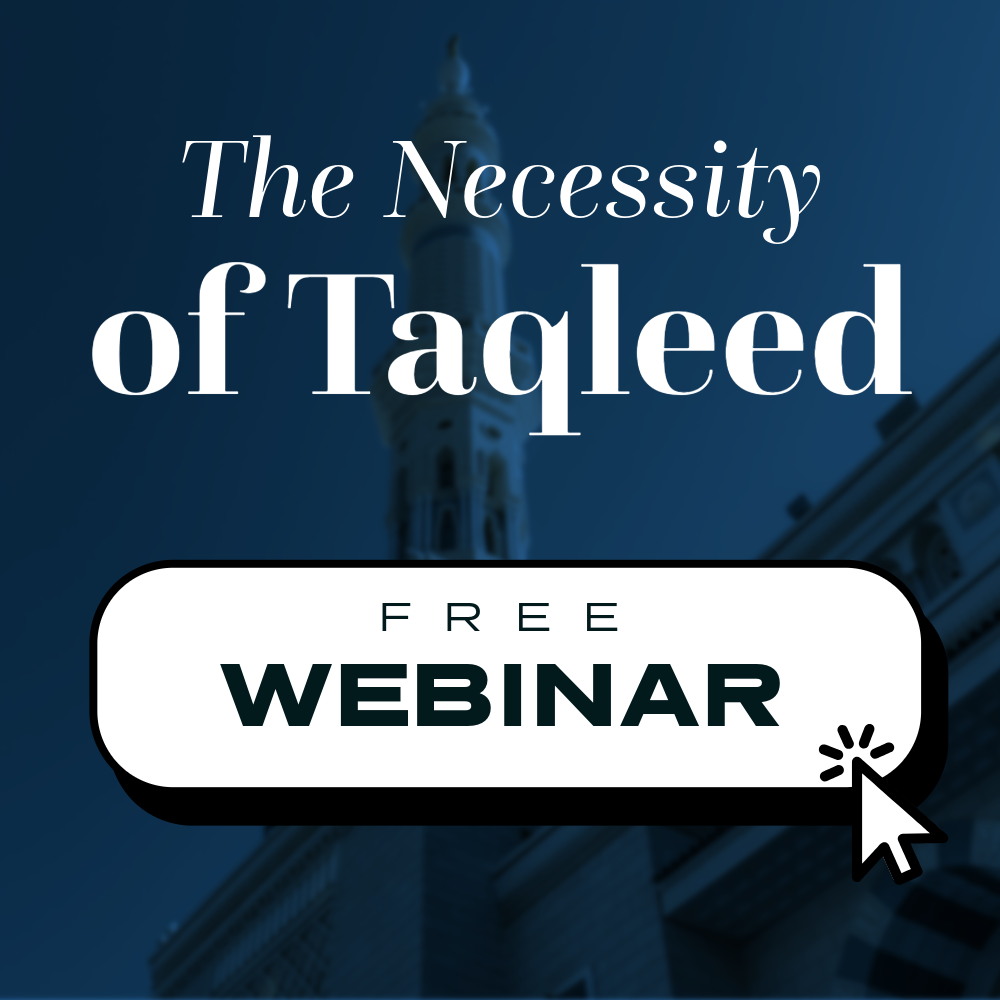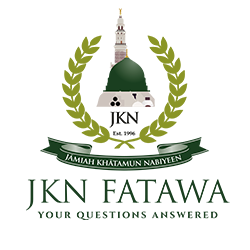
Date: Sunday 19th October 2025
Time: 3:00pm – 5:30pm (2hrs and 30 mins)
Venue: Online
Instructor: Mufti Abdul Waheed
The webinar uses a practical-based approach that combines theoretical content with exercises and case studies. It will be delivered via PowerPoint presentations and includes interactive case studies based on real-life scenarios. The session is designed for two-way interaction between the instructor and participants during the case study activities.
From Confusion to Clarity: Taqlīd — Blind Following or Informed Trust?
Exploring the wisdom, purpose and relevance of following a legal school in Islam.
Introduction to the Webinar
Throughout a millennium, Muslims have always referred to scholars for guidance in living according to and understanding the Qur’an and Sunnah. As the Muslim world expanded, new situations arose — people faced questions, differences and confusions that the earliest generations had never directly encountered. Out of the sincere efforts of the great scholars, the four madhāhib —Hanafi, Maliki, Shafi’ī and Hanbali legal schools- emerged that organised, preserved, and explained Islamic law with clarity and depth.
But in today’s world, many people ask: Why should we follow a madhhab? Isn’t Islam simple and direct? Isn’t taqlid just blind following? Isn’t the Quran and Sunnah not sufficient for us?
This webinar invites you to take a deeper look — not through emotion or hearsay, but through knowledge, history, and wisdom. We’ll explore what taqlīd really means, why the great Imams themselves valued disciplined scholarship, and how following a legal school connects us more closely to the Qur’an and Sunnah — not further away. We also demonstrate with some case examples of how it is impossible to follow the Quran and Sunnah without taqlīd.
By the end of this session, you’ll see taqlīd not as restriction, but a protection — a way to follow Islam with understanding, confidence, and respect for the generations who dedicated their lives to preserving the path of guidance.
Aims & Objectives
This unique workshop aims to:
▪To explain clearly what taqlīd means and why it became a necessary part of Islamic practice.
▪To show the wisdom behind following a legal school and how it preserves unity, structure, and depth in our understanding of the Shariʿah.
▪To explore the difference between taqlīd, ittibāʿ (following evidence), and ijtihād (independent reasoning).
▪To demonstrate how taqlīd operates practically within the framework of the four Sunni schools.
▪To discuss common questions and misconceptions about taqlīd in our times.
▪To inspire a balanced mindset — one that respects traditional scholarship while appreciating the importance of learning and understanding our faith.
Learning Outcomes
By the end of the webinar, participants will be able to:
1. Understand the real meaning and purpose of taqlīd.
2. Recognize the value of the four madhhabs as reliable source of guidance for Muslims today.
3. Differentiate between blind imitation and informed following.
4. Appreciate the value of scholarly tradition and the role of qualified jurists (fuqahāʾ) in preserving Islam’s integrity.
5. Feel confident in following a legal school with understanding — not out of habit, but with conviction and insight.
6. See the beauty and balance of Islam’s legal tradition as something that protects unity and promotes sincere faith.
Topics Covered
▪Definition taqlīd, ittibāʿ (following evidence), and ijtihād (independent reasoning).
▪The basic process and categories of ijtihad.
▪Distinction between taqlid and ittibāʿ.
▪Textual interpretation – clear vs ambiguous forms of text.
▪Prevalence of taqlīd.
▪Addressing common misconceptions – e.g. ‘If a Hadīth is authentic then that is my madhab”
▪Case examples from the Quran and Sunnah of different interpretations.
▪Interactive case study exercises
▪Q&A
▪And much more…..
About the Instructor
Mufti Abdul Waheed has served as a full-time researcher at JKN Fatawa Department for over a decade to date, answering Islamic queries in the form of fatawas on a variety of topics. All of his research fatawas and research papers are approved and published on the JKN Fatawa website under the attestation of Shaykh Mufti Saiful Islam. Many of the fatawas that Mufti Abdul Waheed has researched into in depth include divorce, marriage, dietary laws, finance, inheritance and personal worship. As part of the JKN Fatawa Department project, he also deals with Muslim marriage counselling to supports couple struggling with their marriage relationship and helps people search for a marriage spouse for over a decade. He has delivered various of fiqh and non-fiqh related workshops locally and in various cities, periodically contributes articles on marriage discourse and fiqh topics in the Almumin magazine. He holds a Master’s Degree in Islamic Education – Theory and Practice from Warwick University, earning him a distinction in his research dissertation on the applied pedagogical principles in British Ifta training programs. He lectures at JKN institute in Bradford in Islamic sciences such as, Tafsir (Jalalain), Hadeeth, (Bukhari), Fiqh (Hidayah), Usool-ul-fiqh (Usool Shashi), Inheritance, Seerah, Islamic finance (Fiqhul Buyoo), Aqaid (Aqeedah tahawiyyah), Arabic syntax (Hidayatun Nahw) and Islamic research (Buhooth al-Islamiyyah). He also lectures in the Takhassus fil fiqh course, a three-year part-time course which specialises in training students in Ifta at JKN institute and Al-Balagh Academy. He is one of the senior instructors at al-Balagh Academy and lecture on various fiqh modules and short courses on contemporary fiqh and Hanafi Madhab.
